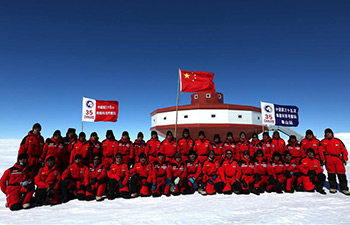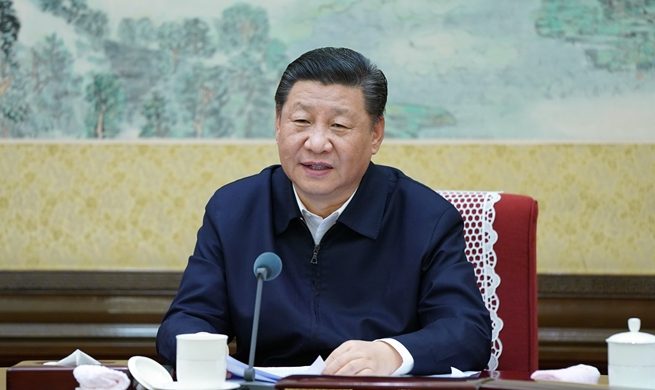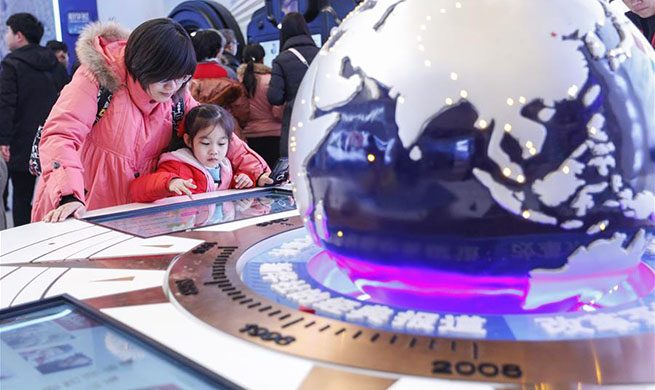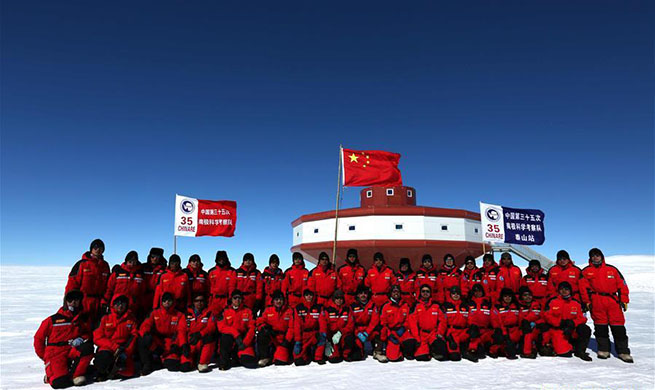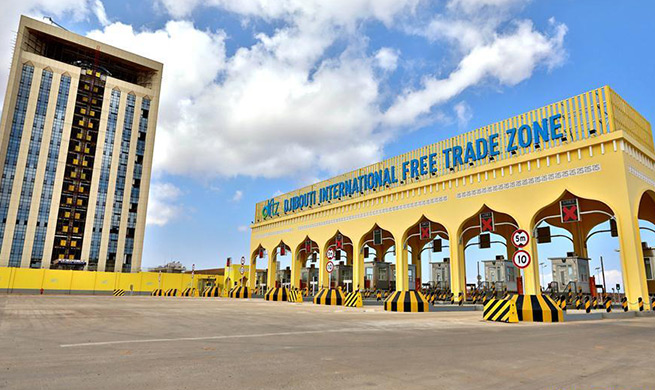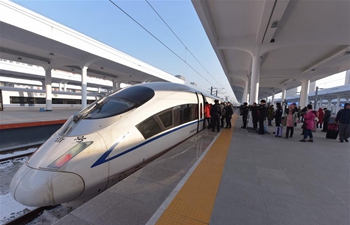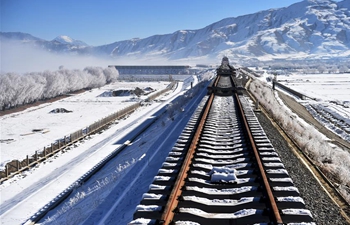BEIJING, Dec. 27 (Xinhua) -- The year of 2018 has seen the world coming to the stage of changing international landscape and the shifting balance of power, facing growing uncertainties and challenges.
To boost confidence and achieve win-win results, the international community is urged to adhere to openness, inclusiveness and cooperation, given the rising protectionist sentiment.
THREATS TO GLOBAL GROWTH
On the economic front, the International Monetary Fund (IMF) said in its outlook in October that "global growth for 2018-19 is projected to remain steady at its 2017 level, but its pace is less vigorous than that projected in April and has become less balanced."
The IMF lowered its forecast for the 2018-2019 growth to 3.7 percent, 0.2 percentage point less for both years than the April forecast, due to "suppressed activity in early 2018 in some major advanced economies, the negative effects of the trade measures implemented or approved between April and mid-September ... geopolitical tensions, and higher oil import bills."
Washington announced in March that it would impose a 25 percent tariff on steel imports and 10 percent on aluminum, and dramatically escalated trade tensions by imposing steep tariffs on Chinese imports worth billions of dollars. China has to hit back proportionally by rolling out its retaliatory tariff plan.
Washington trade hawks' unilateral moves have undermined a rule-based multilateral trading regime with the World Trade Organization (WTO) at its center which had been crucial for collective global growth.
Observers said the U.S. policy, under the pretext of national security, allowed protectionism to rise and resurrect the ghost of unilateralism that has been dormant for decades.
The European Union warned that the multilateral trading system is in "a deep crisis" and the United States is "at its epicenter."
To address this issue, Chinese President Xi Jinping and his U.S. counterpart Donald Trump had an in-depth discussion on Dec. 1 in Argentina. They agreed to prevent further escalation of the trade frictions and put the disputes back on the track of resolution through dialogue and consultation.
In the past decades, economic globalization has brought opportunities as well as challenges for all countries. Erecting trade barriers is the incorrect method to tackle these challenges.
Alongside rational partners, China is committed to promoting global growth and joined the efforts to push for necessary reforms of the WTO through consultation on equal footing.
RISKS TO GLOBAL STABILITY
Besides intensified major-country competition, power shifts accelerated as the international system is undergoing serious strains.
In Europe, Brexit and "Yellow Vest" protests are currently testing the leadership of Britain and France.
Theresa May, who struck a deal with Brussels, survived a no confidence vote earlier this month in her own party and may face a second such vote at Westminster, suggesting a bumpy road three months ahead of Brexit.
The British cabinet has discussed a No Deal Brexit, whereby Britain leaves the EU with no agreement. This could happen on March 29 when the Article 50 exit process expires, which would be hugely disruptive in the short term.
Meanwhile, the "Yellow Vest" protests have been held for weeks since Nov. 17 when people rallied downtown Paris wearing fluorescent-yellow roadside security jackets in opposition to a rise in carbon tax.
Under nationwide pressure, the French government has decided to drop further fuel tax hikes in 2019 and indicated that all tax-related policies would be periodically evaluated.
As a result, Insee, the national statistics body in France, lowered its estimate by two percentage points to 1.5 percent for the 2018 French economic performance.
"The duration and consequences of the 'Yellow Vest' social movement remain very uncertain ... The modalities for implementing the purchasing power support measures announced on Dec. 10 are not yet precisely known...," Insee said.
In Asia, South Korean President Moon Jae-in and Kim Jong Un, top leader of the Democratic People's Republic of Korea, greeted each other with handshakes and hugs at Panmunjom in April, kicking off the first of the three summits between the two sides this year.
Since the historical meeting, the two sides have taken concrete actions to defuse regional tension and start a peace process on the Korean Peninsula.
However, Washington, a key stakeholder on Korean nuclear issue, has recently unilaterally imposed sanctions on senior DPRK officials. In response, the DPRK authority said the U.S. miscalculation could "block the path to denuclearization on the Korean peninsula forever."
EFFORTS TO BOOST CONFIDENCE
Facing the headwinds of protectionism and unilateralism, China has once again taken concrete actions in supporting an open world economy and sharing development opportunities.
Last month, China successfully hosted the first China International Import Expo, the world's first national-level expo devoted to imports, which recorded deals for intended purchases of goods and services worth a total of 57.83 billion U.S. dollars, strongly boosting confidence for global growth.
Meanwhile, the Chinese president and premier made several overseas trips this year, sending messages of jointly supporting multilateralism and free trade while tackling global challenges with the international community.
Over the past year, more partners have joined the Belt and Road construction, which has become the most popular public good and the biggest cooperation platform in today's world.
According to official statistics, in 2018, another 50-plus countries and international organizations signed the cooperation documents within the Belt and Road Initiative (BRI) framework, raising the total number of such documents to over 140.
To date, trade between China and the BRI partner countries has exceeded 6 trillion dollars. The Chinese investment of more than 80 billion dollars in these countries has created at least 240,000 local jobs.
This year also marks the 40th anniversary of China's reform and opening-up. On sessions of national conferences and international platforms through 2018, China loudly repeated its commitment to wider opening-up and deepening reforms.
China's proposals for boosting global growth, like the BRI and the Asian Infrastructure Investment Bank, have highlighted its role as a "responsible stakeholder" in the world, said Stephen A. Orlins, president of the U.S. National Committee on U.S.-China Relations.
Moreover, these initiatives are "basically complementary to the existing world system," namely the World Bank, the Asian Development Bank and the WTO, among others, he noted.
With China "stepping up onto the stage for global governance," it is also making great contributions to global peace and development, Orlins said.
(Xinhua reporter Yang Shilong in New York contributed to this story.)




